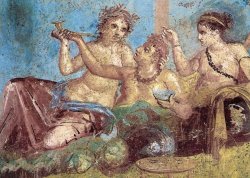How to Be Happy
Posted in: News

On Wednesday, Feb. 23, 2022 Dr. Jean Alvares gave the first talk in a series entitled Advice from the Ancients, sponsored by the Department of Classics & General Humanities, the Center for Heritage & Archaeological Studies, and the Institute for the Humanities. The talk, “How to be Happy,” centered on two currents of thought in an era of great upheaval that began with the domination of Greece by Macedonia in the 330‘s BCE and ended with the Roman destruction of Corinth in 146 BCE. The traditional Greek city-state became politically almost obsolete. Democracy was replaced by the rule of Greek warlords and Roman governors. Traditional Greek religion seemed primitive to many intellectuals, with life appearing mostly under the control of Fate or Fortune.
Epicureanism and Stoicism provided their followers peace of mind amid the world’s chaos, focusing on this life, not the next, and asserting that, while humans could not control what happened to them, they could control their attitude toward those events and peace of mind could be found through following the natural order of the universe. The Stoic cosmos was ruled by an impersonal rationality that worked for the general good and assigned each person their function in the greater system. The Epicureans saw all things arising through purely natural, not divine, causes, and denied interventions by the gods as well as the afterlife. Stoics followed the dictates of reason and duty, while the Epicureans saw pleasure as the only good and pain the only evil: Good and bad come as part of the natural order, and must be accepted like sunrise and sunset.
Both Stoics and Epicureans mistrusted emotions and intense desire. Stoics saw these as gateways to delusion and failure to fulfill one’s role as a human. For the Epicureans, untrammeled desire and sensual indulgence in the long run caused more pain than pleasure. The Stoics saw themselves as citizens of the world, and could with calm mind fill roles ranging from slave to Emperor of Rome. Epicureans preferred to withdraw largely from society, live simple lives in less stressful occupations, and find friendship with like-minded people–one of the greatest human goods. The Epicureans and particularly the Stoics have much to say to us in our unstable times, and are well worth a deeper look.
Following the talk, those present experimented with the whims of Fortune by trying out ancient games of chance using dice—used by ancients as well as moderns–and sheep’s knucklebones—which are not so commonly seen in entertainment today!
